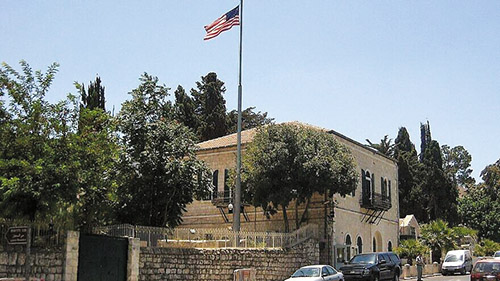
U.S. administration officials have worked to delay a bill proposed by Knesset member Nir Barkat (Likud) which, if passed into law, would essentially prevent the reopening of a de facto U.S. embassy to the Palestinians in Jerusalem.
The bill seeks to ban any country from establishing a diplomatic mission in Jerusalem that is not a mission to Israel. The bill further specifies that any mission established to provide consular services specifically to Jerusalem residents will require special permission from the Israeli government.
Barkat, who in July met with several Republican and Democratic congressmen and senators in Washington to explain the dangers of such a move, told Israel Hayom: “The act of establishing a Palestinian consulate in Jerusalem means recognizing Jerusalem as the capital of Palestine. The administration’s consent on this matter is disastrous. I intend to aggressively fight this dangerous decision. It is a red line that cannot be crossed. Jerusalem will remain the capital of unified [Israel] for all eternity.”
As reported by Israel Hayom in late July, the Biden administration wants the current Israeli coalition to remain intact and, as a result, isn’t likely to challenge it or pose firm demands, such as reopening a Palestinian consulate in Jerusalem, until it passes the national budget.
“Officials in the administration understand that passing the budget is the definitive test for the government’s survivability. Hence, until it is passed, they don’t intend to cause any shockwaves that could jeopardize it,” a U.S. official told Israel Hayom.
The American desire to prevent opposition leader Benjamin Netanyahu from returning to power, the official added, along with the fact that the present coalition includes left-wing parties and the Arab Ra’am Party, are among the reasons for the Biden administration’s favorable approach.
As a reminder, during a visit to Israel in May, U.S. Secretary of State Antony Blinken announced the plans to reopen the Jerusalem consulate—which for years served as the de facto embassy to the Palestinians.
The previous U.S. administration closed the consulate in March 2019, moving it under the U.S. Embassy in the capital. The closure of the consulate was a harsh blow to the Palestinians and diminished the Palestinian Authority’s standing in Washington.
During his election campaign, Biden vowed to reopen the consulate, but such a move appears to be in violation of Israeli, American and international law.
Israel’s Basic Law: Jerusalem, the Capital of Israel (1980), stipulates that “Jerusalem, complete and united, is the capital of Israel.” Opening a diplomatic mission in the city on behalf of a foreign entity is thus potentially illegal as it establishes the city as the capital of a country other than Israel.
Another legal obstacle to the move is the Jerusalem Embassy Act of 1995, passed overwhelmingly by the U.S. House and Senate, which recognized united Jerusalem as the capital of Israel and states that “Jerusalem should remain an undivided city.”
Meanwhile, the Vienna Convention on Diplomatic Relations of 1961, which defines a framework for diplomatic relations between independent countries, stipulates that the “guest state may not, without the prior express consent of the receiving state, establish offices forming part of the mission in localities other than those in which the mission itself is established.”
The Prime Minister’s Office has yet to respond to a request for comment.
By Ariel Kahana/Israel Hayom via JNS









